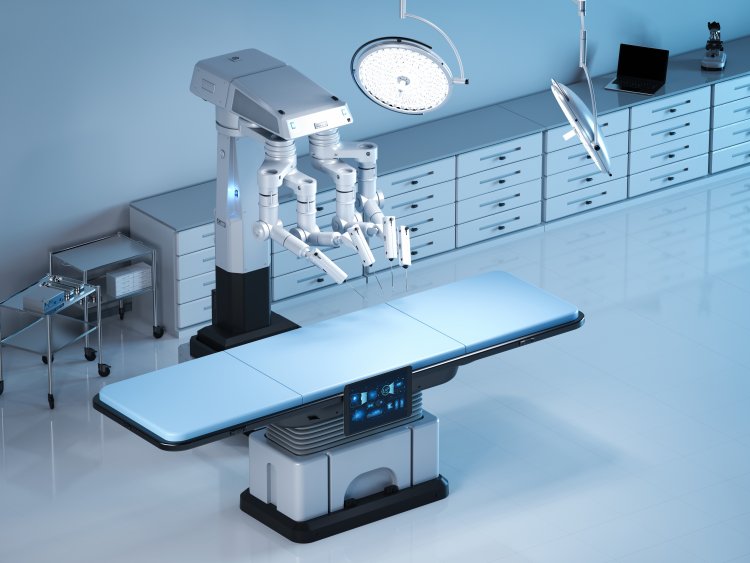Global AI-Based Surgical Robots Market Size to Reach $23.8 Billion at a CAGR of 18.6% by 2030
Vantage Market Research expects the AI-Based Surgical Robots Market to reach USD 23.8 Billion by 2030, exhibiting a growth rate (CAGR) of 18.6% during 2023-2030.

The Global AI-Based Surgical Robots Market size reached USD 6.1 Billion in 2022. Vantage Market Research expects the market to reach USD 23.8 Billion by 2030, exhibiting a growth rate (CAGR) of 18.6% during 2023-2030.
Table of Content [TOC]
|
|
|
|
|
|
|
|
|
|
|
|
|
|
|
|
|
|
|
|
|
|
|
|
|
|
|
|
|
|
|
|
|
|
Revolutionizing Healthcare: The Rise of AI-Based Surgical Robots
Artificial intelligence (AI) technology integration has resulted in tremendous improvements in the healthcare business in recent years. Surgical robots are one field that has significantly profited from AI. Artificial intelligence-powered surgical robots are changing how surgeries are performed, increasing precision, improving patient outcomes, and revolutionizing the healthcare environment.
Request Sample Report of AI-Based Surgical Robots Market @ https://www.vantagemarketresearch.com/aibased-surgical-robots-market-2229/request-sample
Enhanced Precision and Accuracy
One of the key benefits of AI-powered surgical robots is their increased precision and accuracy during surgical procedures. These robots are outfitted with robust imaging systems and sensors that offer surgeons real-time input, allowing them to make informed decisions with pinpoint accuracy. AI algorithms enable these robots to analyze massive volumes of data, assisting surgeons in essential decision-making processes. AI-Based Surgical Robots lower the likelihood of complications during sensitive procedures by eliminating human errors and tremors. The robots can perform exact motions with millimeter accuracy, outperforming even the most proficient human surgeons. This level of precision lessens the chance of tissue damage, reduces post-operative pain, and speeds up the healing process.
Expanding Applications
AI-powered surgical robots have applications that go beyond typical surgical procedures. These robots are becoming more common in specialized fields, including neurosurgery, orthopedics, urology, and cardiovascular surgery. Robots, for example, can explore delicate brain regions with exceptional precision in neurosurgery, reducing the danger of harm to crucial areas. Robots aid in joint replacement surgeries, maintaining accurate alignment and increasing implant lifetime.
Furthermore, AI-powered surgical robots have the potential to make surgical knowledge more accessible to the general public. Skilled surgeons can control robots and perform surgery in remote areas using teleoperation skills. This technology allows patients in outlying areas to obtain high-quality surgical care without traveling or significant wait times, thereby eliminating healthcare inequities.
Future Outlook
The AI-Based Surgical Robot sector is predicted to grow rapidly. v. AI integration with other emerging technologies, such as computer vision, natural language processing, and machine learning, will improve surgical capabilities and transform surgical education and training.
Buy Now Our AI-based Surgical Robots Industry Report @ https://www.vantagemarketresearch.com/buy-now/aibased-surgical-robots-market-2229/0
Conclusion
The rise of AI-powered surgical robots heralds a new age in healthcare. These robots alter the surgical process landscape with their unrivaled precision, improved patient outcomes, and growing applications. AI-Based Surgical Robots have the potential to become a fundamental element of surgical treatment as technology progresses and costs fall, revolutionizing the way we approach complex medical operations and, eventually, enhancing the quality of healthcare for people globally.
Frequently Asked Question (FAQ) – AI-based Surgical Robots Market
- What is AI-based surgical robots? AI-based surgical robots are advanced medical devices that combine artificial intelligence and robotics technology to assist surgeons during complex surgical procedures. These robots provide precision, accuracy, and real-time data analysis to enhance surgical outcomes.
- How do AI-based surgical robots work? These robots use AI algorithms to process information from various sources, such as medical images and patient data. The AI system assists surgeons by providing insights, suggestions, and real-time feedback, enabling them to make informed decisions during surgery.
- What are the advantages of AI-based surgical robots? AI-based surgical robots offer benefits such as increased surgical precision, reduced human error, shorter recovery times, and improved patient outcomes. They also enable minimally invasive procedures, leading to smaller incisions and faster healing.
- Which surgical procedures can AI-based robots assist with? AI-based surgical robots are used in a wide range of procedures, including minimally invasive surgeries, cardiac surgeries, neurosurgeries, orthopedic procedures, and more. They are particularly valuable in complex surgeries that require high precision.
- Are AI-based surgical robots controlled entirely by AI? No, AI-based surgical robots are not fully autonomous. Surgeons remain in control and use the robot as a tool to enhance their skills and decision-making. The AI system provides assistance and recommendations based on real-time data.
- Are AI-based surgical robots safe for patients? Yes, AI-based surgical robots are designed with patient safety in mind. The robots' precision and accuracy help reduce the risk of complications during surgery. Surgeons are still responsible for making crucial decisions and ensuring patient well-being.
- How do AI-based surgical robots impact healthcare costs? While the initial investment in AI-based surgical robots can be significant, they can lead to long-term cost savings by reducing the need for prolonged hospital stays, minimizing complications, and accelerating patient recovery.
- What is the current market status of AI-based surgical robots? The AI-based surgical robots market is growing rapidly, driven by advancements in robotics and AI technology. As more hospitals and healthcare facilities adopt these systems, the market is expected to expand further.
- How can healthcare institutions integrate AI-based surgical robots? Healthcare institutions interested in adopting AI-based surgical robots can work with robotics companies that offer these systems. Training for surgeons and medical staff is essential to ensure the successful integration of these technologies.
Read Our Latest Press Release: Superhydrophobic Coating Market - In-depth Analysis
Contact us
Eric Kunz
6218 Georgia Avenue NW Ste 1 - 564
Washington DC 20011-5125
United States Tel: +1 202 380 9727
Email: [email protected]
Website: Vantage Market Research


















